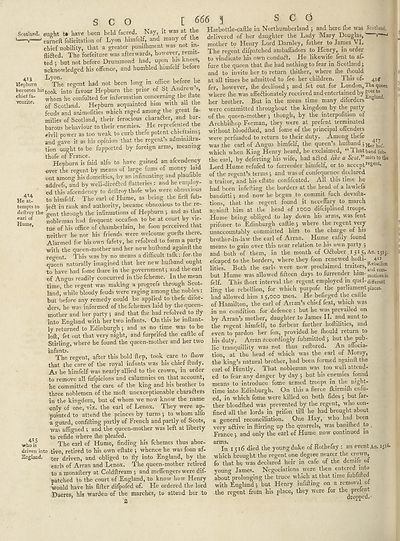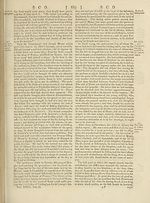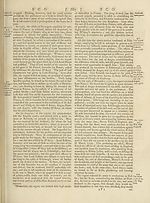Encyclopaedia Britannica, or, a Dictionary of arts, sciences, and miscellaneous literature : enlarged and improved. Illustrated with nearly six hundred engravings > Volume 18, RHI-SCR
(704) Page 666
Download files
Complete book:
Individual page:
Thumbnail gallery: Grid view | List view

vourite.
4T4
He at¬
tempts to
SCO
Scotland, ought t* have been held facred. -
5 v ' carneft folicitation of Lyon himfelf, and many of the
chief nobility, that a greater puniihment was not m-
fliaed. The forfeiture was afterwards, however, remit¬
ted ; but not before Drummond had, upon his knees,
acknowledged his offence, and humbled himfelf betore
Hepburn 'The regent had not been long in office before he
becomes his took into favour Hepburn the prior of St Andrew s,
chietA- whom he confulted for information concerning the ilate
of Scotland. Hepburn acquainted him with all the
feuds and animofities which raged among the great ta-
milies of Scotland, their ferocious charader, and bar¬
barous behaviour to their enemies. He reprefented the
civil power as too weak to curb thefe potent chieftains j
and crave it as his opinion that the regent’s adminiftra-
tion ^ought to be fupported by foreign arms, meaning
thofe of France. . , . ,
Hepburn is faid alfo to have gained an afcendency
over the regent by means of large fums of money laid
out among hisdomeftics, by an infinuatmg and plauhble
addrefs, and bv well-dire&ed flatteries: and he employ¬
ed this afcendency to deftroy thofe who were obnoxious
to himfelf. The earl of Hume, as being the firii fub-
jeft in rank and authority, became obnoxious to the re-
deftroy the „ent through the infmuations of Hepburn ■, and as that
rf1 of nobleman had frequent occafion to be at court by vir-
C’ tue of his office of chamberlain, he foon perceived that
neither he nor his friends were welcome guefts there.
Alarmed for his own fafety, he refolved to form a party
with the queen-mother and her new huffiand againll the
recent. This was by no means a difficult talk: for.the
queen naturally imagined that her new huffiand ought
to have had fome ffiare in the government-, and the earl
of Angus readily concurred in the fcheme. In the mean
time, the regent was making a progrefs through Scot¬
land, while bloody feuds were raging among the nobles :
but before any remedy could be applied to thefe dilor-
ders, he was informed of thefehemes laid by the queen-
mother and her party and that ffie had refolved to fly
into England with her two infants. On this he inflant-
ly returned to Edinburgh and as no time was to be
loft, fet out that very night, and furprifed the caftle of
Stirling, where he found the queen-mother and her two
infants.
The regent, after this bold ftep, took care to Ihow
that the care of the royal infants was his chief ftudy.
As he himfelf was nearly allied to the crown, in order
to remove all fufpicions and calumnies on that account,
he committed the care of the king and his brother to
three noblemen of the moft unexceptionable eharafters
in the kingdom, but of whom we now know the name
only of one, viz. the earl of Lenox. ri. hey were ap¬
pointed to attend the princes by turns •, to whom alfo
a guard, confifting partly of French and partly of Scots,
was affigned ; and the queen-mother was left at liberty
to refide where (lie pleafed.
who is The earl of Hume, finding his fchemes thus abor-
driven into tive, retired to his own eftate whence he was foon af-
England. ter driven, and obliged to fly into England, by the
earls of Arran and Lenox. The queen-mother retired
to a raonaftery at Coldftream •, and meffengers were dif-
patched to the court of England, to know how Henry
would have his filter difpofed of. Fie ordered the lord
Dacres, his warden of the marches, to attend her to
[ 666 3 SCO
Nay it was at the Harbottle-caftle in Northumberland ; and here ffie was Scotland.
y’ - * delivered of her daughter the Lady Mary Douglas,' T—J
mother to Henry Lord Darnley, father to James VI.
The regent difpatched ambaffadors to Henry, in order
to vindicate his own condud. Fie likewife ffint to af-
fure the queen that flie had nothing to fear in Scotland;
and to invite her to return thither, where ffie thould
at all times be admitted to fee her children. This of-
fer, however, ftie declined ; and fed out for London, The queen
where flie was affedionately received and entertained by
her brother. But in the mean time many diforders 8
were committed throughout the kingdom by the party
of the queen-mother; though, by the interpofition of
Archbiffiop Forman, they were at prefent terminated
without bloodlhed, and fome of the principal offenders
were perfuaded to return to their duty. Among thefe
was the earl of Angus himfelf, the queen’s hufband;
which when King Henry heard, he exclaimed, “ Thatband tub.
the earl, by deferting his wife, had adled like a &'c/.”mitstotbe
Lord Hume refufed to furrender himfelf, or to acceptreSent*
of the regent’s terms ; and was of confequence declared
a traitor, and his eftate confifcated. All this time he
had been in felling the borders at the head of a lawlefs
banditti; and now he began to commit fueh devalla-
tions, that the regent found it neceffary to march
againft him at the head of 1000 difeiplined troops.
Hume being obliged to lay down his arms, was fent
prifoner to Edinburgh caftle ; where the regent very
unaccountably committed him to the charge of his
brother-in-law the earl of Arran. _ Hume eafily found
means to gain over this near relation to his own paity ;
and both of them, in the month of Odober 1515, An. 1515.
efcaped to the borders, where they foon renewed hofti- 4i3
lities. Both the earls were now proclaimed traitors, ^ ^
but Hume was allowed fifteen days to furrender him motions in
felf. This ffiort interval the regent employed in quel-different
ling the rebellion, for which purpofe the parliament places,
had allowed him 15,000 men. He befieged the caftle
of Hamilton, the earl of Arran’s chief feat, which was
in no condition for defence : but he was prevailed on
by Arran’s mother, daughter to James II. and aunt to
the regent himfelf, to forbear further hoftilities, and
even to pardon her fon, provided he ffiould return to
his duty. Arran accordingly fubmitted ; but the pub¬
lic tranquillity was not thus reftored. An affocia-
tion, at the head of which was the earl of Moray,
the king’s natural brother, had been formed againft the
earl of Huntly. That nobleman was too well attend¬
ed to fear any danger by day ; but his enemies found
means to introduce fome armed troops in the night¬
time into Edinburgh. On this a fierce fkirmifli enfu-
ed, in which fome were killed on both fides ; but far¬
ther bloodffied was prevented by the regent, who con¬
fined all the lords in prifon till he had brought about
a general reconciliation. One Hay, who had been
very a£live in ftirring up the quarrels, was banilhed to .
France; and only the earl of Hume now continued in
In 1516 died the young duke of Rothefay : an event An. 151®'
which brought the regent one degree nearer the crown,
fo that he was declared heir in cafe of the demife or
young James. Negociatiotis were then entered into
about prolonging the truce which at that time fubfifted
with England ; but Henry infilling on a removal oi
the regent from his place, they were for the preient
dropped.-
4T4
He at¬
tempts to
SCO
Scotland, ought t* have been held facred. -
5 v ' carneft folicitation of Lyon himfelf, and many of the
chief nobility, that a greater puniihment was not m-
fliaed. The forfeiture was afterwards, however, remit¬
ted ; but not before Drummond had, upon his knees,
acknowledged his offence, and humbled himfelf betore
Hepburn 'The regent had not been long in office before he
becomes his took into favour Hepburn the prior of St Andrew s,
chietA- whom he confulted for information concerning the ilate
of Scotland. Hepburn acquainted him with all the
feuds and animofities which raged among the great ta-
milies of Scotland, their ferocious charader, and bar¬
barous behaviour to their enemies. He reprefented the
civil power as too weak to curb thefe potent chieftains j
and crave it as his opinion that the regent’s adminiftra-
tion ^ought to be fupported by foreign arms, meaning
thofe of France. . , . ,
Hepburn is faid alfo to have gained an afcendency
over the regent by means of large fums of money laid
out among hisdomeftics, by an infinuatmg and plauhble
addrefs, and bv well-dire&ed flatteries: and he employ¬
ed this afcendency to deftroy thofe who were obnoxious
to himfelf. The earl of Hume, as being the firii fub-
jeft in rank and authority, became obnoxious to the re-
deftroy the „ent through the infmuations of Hepburn ■, and as that
rf1 of nobleman had frequent occafion to be at court by vir-
C’ tue of his office of chamberlain, he foon perceived that
neither he nor his friends were welcome guefts there.
Alarmed for his own fafety, he refolved to form a party
with the queen-mother and her new huffiand againll the
recent. This was by no means a difficult talk: for.the
queen naturally imagined that her new huffiand ought
to have had fome ffiare in the government-, and the earl
of Angus readily concurred in the fcheme. In the mean
time, the regent was making a progrefs through Scot¬
land, while bloody feuds were raging among the nobles :
but before any remedy could be applied to thefe dilor-
ders, he was informed of thefehemes laid by the queen-
mother and her party and that ffie had refolved to fly
into England with her two infants. On this he inflant-
ly returned to Edinburgh and as no time was to be
loft, fet out that very night, and furprifed the caftle of
Stirling, where he found the queen-mother and her two
infants.
The regent, after this bold ftep, took care to Ihow
that the care of the royal infants was his chief ftudy.
As he himfelf was nearly allied to the crown, in order
to remove all fufpicions and calumnies on that account,
he committed the care of the king and his brother to
three noblemen of the moft unexceptionable eharafters
in the kingdom, but of whom we now know the name
only of one, viz. the earl of Lenox. ri. hey were ap¬
pointed to attend the princes by turns •, to whom alfo
a guard, confifting partly of French and partly of Scots,
was affigned ; and the queen-mother was left at liberty
to refide where (lie pleafed.
who is The earl of Hume, finding his fchemes thus abor-
driven into tive, retired to his own eftate whence he was foon af-
England. ter driven, and obliged to fly into England, by the
earls of Arran and Lenox. The queen-mother retired
to a raonaftery at Coldftream •, and meffengers were dif-
patched to the court of England, to know how Henry
would have his filter difpofed of. Fie ordered the lord
Dacres, his warden of the marches, to attend her to
[ 666 3 SCO
Nay it was at the Harbottle-caftle in Northumberland ; and here ffie was Scotland.
y’ - * delivered of her daughter the Lady Mary Douglas,' T—J
mother to Henry Lord Darnley, father to James VI.
The regent difpatched ambaffadors to Henry, in order
to vindicate his own condud. Fie likewife ffint to af-
fure the queen that flie had nothing to fear in Scotland;
and to invite her to return thither, where ffie thould
at all times be admitted to fee her children. This of-
fer, however, ftie declined ; and fed out for London, The queen
where flie was affedionately received and entertained by
her brother. But in the mean time many diforders 8
were committed throughout the kingdom by the party
of the queen-mother; though, by the interpofition of
Archbiffiop Forman, they were at prefent terminated
without bloodlhed, and fome of the principal offenders
were perfuaded to return to their duty. Among thefe
was the earl of Angus himfelf, the queen’s hufband;
which when King Henry heard, he exclaimed, “ Thatband tub.
the earl, by deferting his wife, had adled like a &'c/.”mitstotbe
Lord Hume refufed to furrender himfelf, or to acceptreSent*
of the regent’s terms ; and was of confequence declared
a traitor, and his eftate confifcated. All this time he
had been in felling the borders at the head of a lawlefs
banditti; and now he began to commit fueh devalla-
tions, that the regent found it neceffary to march
againft him at the head of 1000 difeiplined troops.
Hume being obliged to lay down his arms, was fent
prifoner to Edinburgh caftle ; where the regent very
unaccountably committed him to the charge of his
brother-in-law the earl of Arran. _ Hume eafily found
means to gain over this near relation to his own paity ;
and both of them, in the month of Odober 1515, An. 1515.
efcaped to the borders, where they foon renewed hofti- 4i3
lities. Both the earls were now proclaimed traitors, ^ ^
but Hume was allowed fifteen days to furrender him motions in
felf. This ffiort interval the regent employed in quel-different
ling the rebellion, for which purpofe the parliament places,
had allowed him 15,000 men. He befieged the caftle
of Hamilton, the earl of Arran’s chief feat, which was
in no condition for defence : but he was prevailed on
by Arran’s mother, daughter to James II. and aunt to
the regent himfelf, to forbear further hoftilities, and
even to pardon her fon, provided he ffiould return to
his duty. Arran accordingly fubmitted ; but the pub¬
lic tranquillity was not thus reftored. An affocia-
tion, at the head of which was the earl of Moray,
the king’s natural brother, had been formed againft the
earl of Huntly. That nobleman was too well attend¬
ed to fear any danger by day ; but his enemies found
means to introduce fome armed troops in the night¬
time into Edinburgh. On this a fierce fkirmifli enfu-
ed, in which fome were killed on both fides ; but far¬
ther bloodffied was prevented by the regent, who con¬
fined all the lords in prifon till he had brought about
a general reconciliation. One Hay, who had been
very a£live in ftirring up the quarrels, was banilhed to .
France; and only the earl of Hume now continued in
In 1516 died the young duke of Rothefay : an event An. 151®'
which brought the regent one degree nearer the crown,
fo that he was declared heir in cafe of the demife or
young James. Negociatiotis were then entered into
about prolonging the truce which at that time fubfifted
with England ; but Henry infilling on a removal oi
the regent from his place, they were for the preient
dropped.-
Set display mode to:
![]() Universal Viewer |
Universal Viewer | ![]() Mirador |
Large image | Transcription
Mirador |
Large image | Transcription
Images and transcriptions on this page, including medium image downloads, may be used under the Creative Commons Attribution 4.0 International Licence unless otherwise stated. ![]()
| Permanent URL | https://digital.nls.uk/193027859 |
|---|
| Attribution and copyright: |
|
|---|
| Description | Ten editions of 'Encyclopaedia Britannica', issued from 1768-1903, in 231 volumes. Originally issued in 100 weekly parts (3 volumes) between 1768 and 1771 by publishers: Colin Macfarquhar and Andrew Bell (Edinburgh); editor: William Smellie: engraver: Andrew Bell. Expanded editions in the 19th century featured more volumes and contributions from leading experts in their fields. Managed and published in Edinburgh up to the 9th edition (25 volumes, from 1875-1889); the 10th edition (1902-1903) re-issued the 9th edition, with 11 supplementary volumes. |
|---|---|
| Additional NLS resources: |
|

